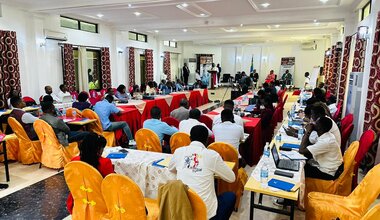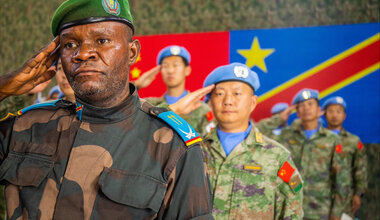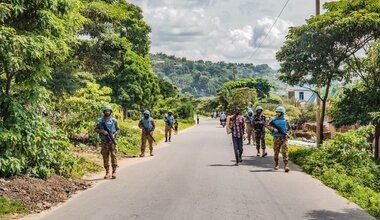MONUSCO explains its mandate to the local actors in Kigongo, Uvira, South-Kivu province
Uvira, 18 June 2015 – In accordance with its mandate, a multi-disciplinary team of the United Nations Stabilization Mission in the Democratic Republic of Congo comprising five Sections: Public Information, United Nations Joint Human Rights Office (UNJHRO), Civil Affairs and DDR-RR (Disarmament, Demobilization, Reintegration and Repatriation) interacted last Thursday 18 June 2015 with civilian populations in Kigongo, Kalungwe grouping, a dozen kilometers away from Uvira on its role in the South-Kivu province. MONUSCO briefed the local population on the activities conducted by the various sections of the stabilization mission.
Elie Byamungu Ruhanika, the chief of the local NGO “Association des Jeunes Novateurs du Développement (AJENED)” reported that “the studies conducted by his NGO in the Kalungwe Grouping revealed the proliferation and free movement of light weapons among civilian populations, especially in the localities of Kifuta, Gomba, Kikala, Katana where many residents are members of the local and foreign groups,” mainly, LUCKY DUBE, Raia Mutomboki, FDLR and armed Burundians. The meeting offered to the local actors the opportunities to effectively fight armed groups, harassments and human rights violations. Each Section gave a briefing on their activities.
Public Information, as far as concerned, focused on the need for circulating information, thus encouraging the population to communicate to the security forces and Human Rights defense NGOs any information likely to contribute to civilians’ protections. The United Nations Police (UNPOL) focused on its supportive mission to the Congolese Police in terms of training and counselling. Once again, the population was urged to collaborate with the Congolese Police in denouncing the criminals and armed gangs. In the event whistleblowers would face threats, said the United Nations Joint Human Rights Office, they should complain to the Judiciary Police Officers.
DDR section for its part, explained the strategies in place to guide local armed groups to lay down weapons and foreign armed groups, especially FDLR to join the disarmament process for the purposes of their repatriation. Civil Affairs Section provided participants with information regarding the mechanisms for civilian protection within MONUSCO, tools which the population may resort to at any time. The thirty participants to this meeting included traditional leaders, representatives of religious denominations, women’s and youth movements as well as the Congolese Police, Intelligence, local NGOs and Civil Society organizations. Moreover, Benjamin Busenge Malole “chief of the groupement” applauded this first initiative” and committed to bring together the 18 Chiefs of Localities under his “Groupement” to raise their awareness of the different mechanisms for civilians’ protection.
Jean-Tobie Okala
Photos: MONUSCO/Fiston Ngoma
 ONU
ONU Nations Unies Maintien de la paix
Nations Unies Maintien de la paix



